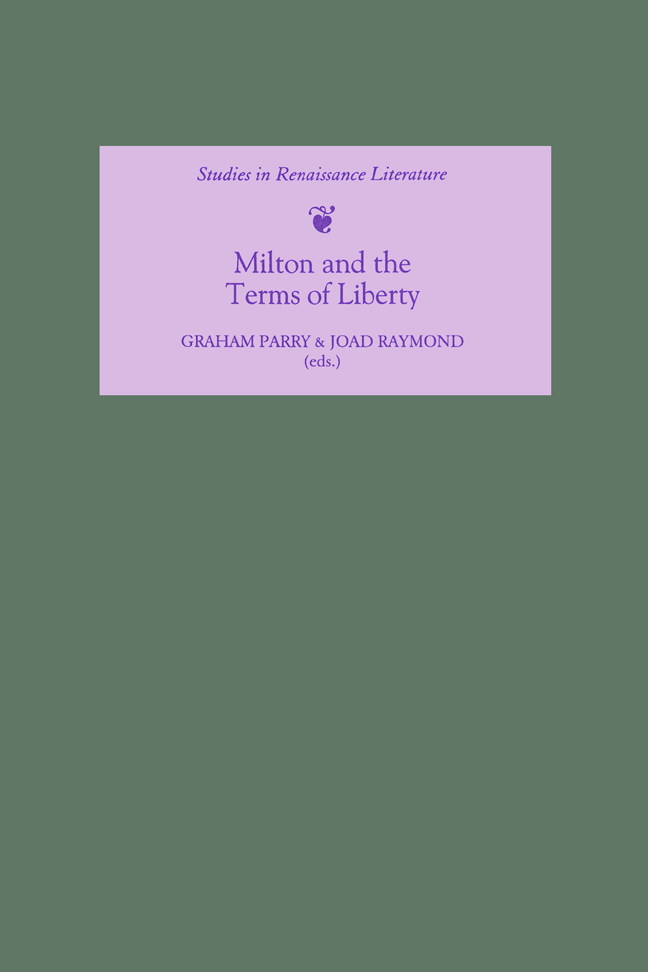Book contents
- Frontmatter
- Contents
- Contributors
- Acknowledgements
- Introduction
- 1 John Milton and the Politics of Slavery
- 2 Milton before ‘Lycidas'
- 3 Prosody and Liberty in Milton and Marvell
- 4 'In These Western Parts of the Empire': Milton and Roman Law
- 5 The King is a Thing
- 6 'in time of Warre … our Language is all corrupt with military Tearms': The Politics of Martial Metaphors in Post-regicide England
- 7 Alexander More Reads Milton: Self-representation and Anxiety in Milton's Defences
- 8 Stylometry and the Provenance of De doctrina christiana
- 9 The Figure and the Ground: Samson as a Hero of London Nonconformity, 1662-1667
- 10 The Publication of the King's Privacy: Paradise Regained and Of True Religion in Restoration England
- 11 'To try, and teach the erring Soul': Milton's Last Seven Years
- 12 Pandemonic Panoramas: Surveying Milton's ‘vain empires’ in the Long Eighteenth Century
- Index
- Studies in Renaissance Literature
3 - Prosody and Liberty in Milton and Marvell
Published online by Cambridge University Press: 15 February 2024
- Frontmatter
- Contents
- Contributors
- Acknowledgements
- Introduction
- 1 John Milton and the Politics of Slavery
- 2 Milton before ‘Lycidas'
- 3 Prosody and Liberty in Milton and Marvell
- 4 'In These Western Parts of the Empire': Milton and Roman Law
- 5 The King is a Thing
- 6 'in time of Warre … our Language is all corrupt with military Tearms': The Politics of Martial Metaphors in Post-regicide England
- 7 Alexander More Reads Milton: Self-representation and Anxiety in Milton's Defences
- 8 Stylometry and the Provenance of De doctrina christiana
- 9 The Figure and the Ground: Samson as a Hero of London Nonconformity, 1662-1667
- 10 The Publication of the King's Privacy: Paradise Regained and Of True Religion in Restoration England
- 11 'To try, and teach the erring Soul': Milton's Last Seven Years
- 12 Pandemonic Panoramas: Surveying Milton's ‘vain empires’ in the Long Eighteenth Century
- Index
- Studies in Renaissance Literature
Summary
SEVENTEENTH-CENTURY POETS were as aware as any that verse-form is embodied meaning, not just an envelope. In Herbert's ‘The Collar’ – to take a clear example – the violent irregularity of line-length and rhyme is tempered by the orthodoxy of iambic rhythm, so expressinghow the speaker is able in recollection to temper the state of rebellion through which he has now passed. In Waller's ‘A Panegyric to my Lord Protector', the poet's need to reassure us that a land ‘torn with civil hate’ is now restored and ‘made a glorious state’ (lines 13-14) is conveyed through couplets of insinuating smoothness and harmony. In Cowley's irregular Pindaric, 'Ode upon Liberty', freedom of form expresses freedom of mind:
If Life should a well-order'd Poem be …
The more Heroique strain let others take,
Mine the Pindarique way I'le make.
The Matter shall be Grave, the Numbers loose and free.
So at first glance it is surprising that the two great Puritan poets of the century, John Milton and Andrew Marvell, are so diverse in prosody. Opponents sometimes lumped them together – ‘the odds betwixt a Transproser and a Blank Verse Poet, is not great' – and indeed there were personal, political, theological and literary affiliations between them. Milton sought to advance Marvell under Cromwell, and Marvell intervened to protect Milton at the Restoration and to defend him in The Rehearsal Transpros'd. No living writer mattered as profoundly to Marvell as Milton did: he was the first poet to echo Milton repeatedly in his own verse, and he admired Milton so much he chose to memorise that substantial work, Pro populo anglicano defensio secunda or The Second Defence of the English People. Moreover, both writers devoted their lives to the cause of liberty as they perceived it. Marvell was, as Warren Chernaik has written, ‘the consistent opponent of arbitrary power and champion of man's rational freedom', while Milton presents all his writing as a defence of liberty in its manifold forms, ‘because the gaining or loosing of libertie is the greatest change to better or to worse that may befall a nation under civil goverment'.
Nevertheless, in verse technique the two poets are far apart. Milton stands for freedom of form, and is always a conspicuous innovator as a prosodist.
- Type
- Chapter
- Information
- Milton and the Terms of Liberty , pp. 37 - 56Publisher: Boydell & BrewerPrint publication year: 2002



